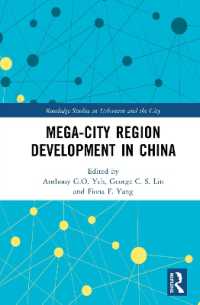- ホーム
- > 洋書
- > 英文書
- > Politics / International Relations
Full Description
This book explores one of the most urgent questions of our time: how can socialism help humanity navigate the challenges of the AI age? The rapid proliferation of artificial intelligence raises serious concerns about the future of humanity—concerns for which we are woefully unprepared, as many leading thinkers have warned. AI is intensifying deep-rooted problems within capitalism, such as job displacement and widening wealth inequality, while also paving the way for a necessary transition beyond capitalism.Post-capitalism is framed here not merely as an economic shift, but as a civilizational project—one that moves from a world defined by scarcity to one of abundance. This transformation requires questioning many of the basic assumptions that have shaped capitalist and pre-capitalist societies. Our biggest obstacle is our inability to break free from long-held, taken-for-granted ways of thinking. Using China as the central case study, the book outlines key elements of a post-capitalist civilization: from motivation and wealth distribution, to innovation, entrepreneurship, markets, and modes of production.Focusing on solving the most important problems confronting humanity, this book offers out-of-the-box ideas rooted in the context of China's ongoing experiment with 'socialism with Chinese characteristics for a new era.' With a shorter history of capitalism and less attachment to Western liberalism, China may be uniquely positioned to lead the transition—if it can think clearly and boldly on a civilizational scale. This thought-provoking work invites readers to rethink the future, not just for China, but for the world.







